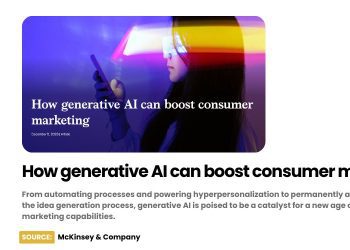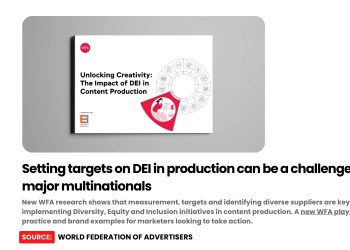Four of WFA’s strategic partners share their views on what will define marketing for the year ahead
WFA asked industry experts from four of its strategic partners The Customer Framework, Digital Decisions, Ebiquity and The Observatory International to identify the trends that will shape the marketing industry this year.
Culture will sit at the heart of marketing transformation
Nick Broomfield, Executive Director and CMO, The Customer Framework, on a new approach for marketing transformation initiatives:
“2020 will be the year that sees organisation and culture overtake technology as the most important components of marketing transformation.
To date, the majority of marketing and digital transformation initiatives have focused on technology, with organisations often developing tech-stacks without due consideration given to how they will be used, or how they will deliver incremental value. Unsurprisingly, this results in expensive white elephants that are not fit for purpose within legacy organisation structures and so remain under-utilised – much like the old days of CRM. In 2018-19, 70% of transformation programs were perceived as failures as they did not focus adequately on people and behaviour (wasting $900bn of the $1.3tn invested!) – what Forbes called ‘mis-management on a colossal scale’.
We also know that organisations that focus on people, behaviours, process re-engineering and culture are five times more likely to succeed with delivering sustainable change and commercial benefit than those that don’t. Hence, in 2020, as smart CMOs focus on people, process and culture change to drive customer centric marketing and digital transformation, we predict the transformation success rate, and the commercial success that comes with it, will improve significantly.”
Leading global management consultancy, The Customer Framework (TCF) is WFA’s newest strategic partner. TCF provides WFA and its members with global insight in the fields of business and marketing transformation.
Taming the wild beast
Ruben Schreurs, CEO, Digital Decisions, on the definitive change of ownership standards when it comes to data:
“The last decade has been filled with rapid change and numerous major exposés in digital media, whilst digital went from making up less than a fifth of global ad spend to more than half in just 10 years.
We are now entering an era of saturation, where the industry will normalize through regulation, both self-regulation and government involvement. Brands are deploying governance standards and are pursuing innovation in a more sustainable way, as opposed to harvesting and using any available source of data or chasing the next big marketing hype.
A key theme for brands we speak with is accountability, where decisions have to have a proper business case behind them and measuring risk has become integral to digital media operations. Whether it’s ad fraud, brand safety, data protection or ad quality standards – we can expect more structural oversight and enforced accountability for the media partners of brands, including both technology platforms to media agencies.”
A new approach to in-housing
Stuart Pocock, Founder and Managing Partner, The Observatory International, says marketers will take a more cautious view on in-housing:
“Agency in-housing as an option will remain towards the top of many marketers’ agendas in 2020, though we predict less enthusiasm for ‘full-service’ options.
As businesses contemplate the difficulties in both attracting and retaining genuine talent along with the potential HR horrors if it all goes wrong, the appeal of this approach may start to lose its lustre and it’s likely that many will pull back. You can, after all, simply fire an agency that’s not delivering on quality – more difficult if they are your employees.
Nevertheless, many businesses will continue to see the obvious benefits of bringing certain aspects of their marketing activity in house. Social, programmatic and high volume ‘work and turn’ production that doesn’t need outstanding strategy and creative are all potential areas of benefit. These in-house teams will also be able to take their lead from external agencies that have both the talent and expertise to deliver smart strategy and creative excellence.”
Your purpose is growth
Christian Polman, Chief Strategy Officer, Ebiquity, on aligning brand purpose with business performance:
“In 2020, marketing leaders will refocus the purpose of marketing for their organisations on its ability to drive financial performance. In so doing, they will enhance the ways in which the discipline can best deliver growth and drive business transformation.
This requires action in three priority areas: building capabilities, dismantling silos, and embracing analytics:
- First, it means building new capabilities and recruiting fresh talent to deliver new and better customer experiences, content, and propositions.
- Second, it calls for enhanced cross-functional collaboration, breaking down silos across technology, analytics, sales, eCommerce, and other critical functions that all have a role to play in genuinely integrated marketing and business transformation.
- And third, it entails embedding smart use of data and analytics throughout a business, much of which marketing can lead.
Only in this way can brands truly understand what does and doesn’t drive value and how they can best align investment behind the right models for them.”








